Anne M. Chappel's Blog
March 19, 2023
A visit to my Homeland – Zanzibar
A visit to my Homeland – Zanzibar
… and a Meditation on ABUNDANCE (Part 2)
By Bhadra Vadgama.
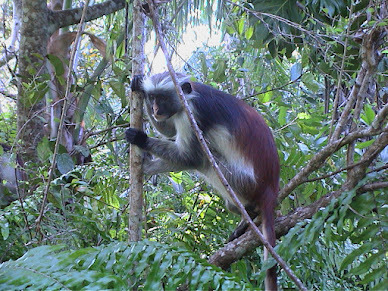
We spent a day visiting Jozani Forest, a place I had never visited before.
It was exciting to see the Zanzibar Red Colobus monkey, Procolobus kirkii close up. Its population count is about 1000. It is a rainforest species (unlike the black-and-white colobus found in other regions of Africa), is also known as Kirk’s red colobus, named after Sir John Kirk, the British Resident of Zanzibar who had first brought it to the attention of zoological science.
However, what was even more impressive was the thick mangrove plantation.
Visit this site to see the monkeys and the mangrove forest.
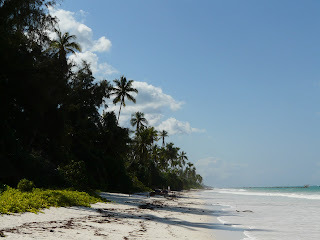
Matemwe Beach
We then spent two days on Matemwe Beach, on the northeast coast of the Island and stayed in Tamani Villas. Check their site
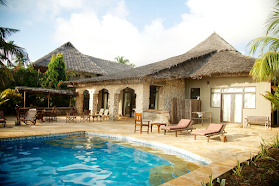
tamanifoundation.org
We chose this place because Tamani was founded on a deep passion for education, and the desire for giving back to the local community. The founders, Shabbir & Fatema Somji, having successfully sent all their kids to college, decided the time was ripe to fulfil their dream of one day opening their own school that would serve the locals of Tanzania. My nephew is one of the trustees, and with his recommendation and our interest in education we decided to stay there and perhaps spend a day in the school. They run nursery and primary schools and a computer centre.
Unfortunately, it was the midterm holiday break: the school was closed. However, we were able to meet Zahra Panjwani, a British Ithnashari lady who is the head of the Academy and she took us around to show us the campus. She explained to us the difficulties she faced being in a village where electricity was erratic and there was a lack of funds to buy necessary equipment for the Academy. Watch this video to see the marvellous job a young lady is doing. Here is what she said about her post:
“Currently, I am the Academic Manager at Tamani Foundation, responsible for the operation and running of the whole school from nursery up to primary. I have a wide and diverse range of responsibilities, including managing and training the teachers(including providing training programmes for teachers abroad), teaching students and adults, organising key events, interviewing prospective teachers, observing teachers and providing CPD, providing support systems and meeting with parents and parents committee, linking with other foundations and schools, involvement with education inspections, developing curriculums and ultimately raising the standard of teaching and learning throughout the school.”
Watch the video https://m.youtube.com/watch?v=18KKPxlhmcY
They need volunteers, so why not offer a few weeks if you have time to spare?
Because of the holiday time, there were many students hanging around the beach, and we were lucky to record a song in Kiswahili sung by two young girls. Later on, we met some boys who were revising science in a group out in the open. We had a pleasant chat with them, and I ended up drawing a map in the sand to explain to them the geographical position of Zanzibar. Great fun it was. We talked to local Masaaiis; I even joined in their jumping dance on the beach.
One experience was exceptional - at no point we felt unsafe. We followed a local man who, at our request, was trying to take us to a spot from where we could watch the sunset! You would know how quickly it gets dark in the Tropics once the sun has set. And yet here were following a total stranger as if he was a friend.
There was still a lot ‘Abundance’ for me to collect. We met an interesting Asian lady from Zambia we befriended one evening while we went for a meal in the nearby hotel.
We had a good rapport with our taxi driver, who loved Bollywood songs. I ended up explaining the meaning of some of his favourites. It also meant I could listen to Indian music while travelling at a snail’s speed of less than 30 mph on fairly good roads. It was delightful to hear about his young wife and son.
Once back in Stone Town, we decided to stay at the Mizingani hotel on the seafront, not far from where we were to board the ferry back to Daressalaam. The hotel had beautiful old furniture. The bed next to the swimming pool is a typical four-poster bed found in Gujarati havelis in India and must have been made by a Gurjar Suthar. You can see it in the site below:
https://www.mizinganiseafront.co.tz/
Also, in the video, you can see the state of our secondary girls’ school.
We took a stroll around the Forodhani, and although we enjoyed a drink of fresh sugarcane juice, we refrained from eating the variety of fresh seafood, meat and vegetarian dishes cooked by locals on their small portable ‘stalls’ as not only did it all look confusing but also the flies hovering over the food didn’t appeal to us.
If you put Forodhani Gardens Zanzibar and looked at the images, you will get an idea of the variety of foods offered and the buzz of the tourists in the evening.
Throughout our stay in the town, we noticed groups of tourists, escorted by a local young tour guide. We had an opportunity to talk to one who spoke French, which he had studied at Zanzibar University. He found conversation with us fascinating as we had first-hand knowledge of some of the sites near the Forodhani, like the Beit-el-Ajaib, the Portuguese Fort, Princess Margaret Jetty and Euan Smith Madressa School. He laughed and said, ‘You know so much more than me. I sometimes just make up things for the tourists!’ I even advised him on how to promote his trade.
We found a pure vegetarian Gujarati restaurant for our evening meal, and once again I ended up teaching the African waitress how to greet customers in Gujarati, ‘Kem chho? Aavo. Khavanun saras chhe.’
We had the whole morning to roam around the town as we were catching a late afternoon ferry. We walked through the main road and bumped into Master Malkan’s sons and their families who were now residing in the States. I couldn’t believe the hotel they stayed in was converted from our Haveli in the street next to D S Babla’s shop. By the way, that shop is now an up-market jewellery shop. The African owner was delighted to talk to us and talked about Kanubha Babla and his family, whom he had met..
It was delightful to be caught up in one of those short tropical showers and take refuge under the roof of the door leading to my late classmate Sushila Valambhia’s house. No one was carrying an umbrella! And as predicted, the rain stopped shortly.
We wanted to visit Victoria Gardens but unfortunately, the road from the High Court, now called Kaunda Road, was closed to the public since the old British Residency has become the State House for the President of Zanzibar. So down we went through a side road and emerged at the Medical Centre, a place where I had my first smallpox vaccination in 1940s.
We would have loved to visit the museums, but time was limited.
On our way back, we saw a gate that went into Victoria Gardens. So happily we went in, only to be stopped by a member of Government staff as it was a restricted area. He too, was very cordial towards us when we told him we were born in Zanzibar.
There were hordes of people sitting around that area, and one little girl looked ill. Talking to the mother we discovered she had a headache, so I gave her a little acupressure, and she let me. I hope she was cured.
We walked on the beach at what we used to call German Fordho and through back street by our Hindu Kanyashala. It looked good. We read the posters outside the house where Freddie Mercury was born [opposite D S Babla’s old shop].
My Abundance hadn’t deserted me yet. On the ferry back to Daressalaam, a young man sat next to me, and in my usual way I started talking to him. His great-grandfather had moved to Zanzibar from Diu, the Portuguese colony in Gujarat. He told me that he had kept records of his grandfather’s business, including invoices and receipts etc., which started in 40s. His family had moved to the mainland after the 1964 Revolution. He said he had started to write his family history. I was extremely pleased to find a young Gujarati man who was interested in this field, unlike our ancestors. I put him in touch with Prof. Renu Modi, Head of the Afro Asian Studies at the University of Mumbai. She is always on the lookout for such personal history about East African Indians and would definitely advise the young man on how to collate his data.
Back in Daressalaam, I stayed with my sister Dhanlaxmi, my nephew Chandresh and his wife Bhavini, who had been one of the meditation group participants. They lived on the outskirts of the city in a very quiet area. The Kutchhi Patel owner turned out to be the uncle of a close friend of mine in London. Coming from a farming community, the landlord was very much into gardening. Not only was there a well-maintained garden with lovely flowers, but there was also a large vegetables and herbs garden as well.
A swim in the pool was refreshing. Abundance was there in terms of love from the family and the beautiful environment.
A visit to watch the local craftsmen carve wooden sculptures was a special treat. I also had the opportunity of visiting Chuma Art Gallery in Oyster Bay area to see a great variety of paintings by local and other African artists. The owner’s circular house was unique in terms of architecture. It was nice to greet his very old mum, who was born in Zanzibar in the Jafferji family.
Sunday brunch at Oyster Bay is a must for all tourists. The beach that used to be visited by Indians on Sundays is totally transformed into a food fair, like the Forodhani of Zanzibar. Freshly fried mohogochips with fresh coconut chutney were delicious.
Finally, a visit to the Hindu haveli where I met cousins and old friends from Zanzibar and ended the visit by a meal with my brothers, sister and their families in a local Indian restaurant.
Both Rozy and I felt we needed more time to be with our families in Dar, to explore Stone Town of Zanzibar more fully and to visit the nearby islands.
March 17, 2023
A Meditation on ABUNDANCE & a visit to my Homeland. ...
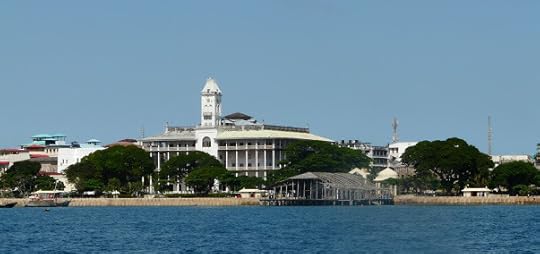 The House of Wonders or Beit al Ajaib
The House of Wonders or Beit al AjaibBy Bhadra Vadgama
My last visit to Zanzibar was in July 1999. So it was over 20 years since I visited my place of birth. In the meantime, ‘in the year 2000, Zanzibar Stone Town was inscribed on the UNESCO World Heritage List due to its globally important heritage and build environment.’ So I was expecting a better state of the town since my last visit.
It so happened that I was going there with my historian friend Rozina Visram. I always called her Rozy. She and I shared a desk at the Government Girls’ Secondary School in Zanzibar from 1953-1956. We both moved to Britain in 70s where she became a teacher and later author of some major works on the 400 years of the history of Asians in Britain. We both had taught at our old school in Zanzibar and also in Uganda and Kenya. In Britain, I had changed my career and my major occupational years were spent as the Librarian in charge of the London Borough of Wandsworth’s Multicultural Library.
My visit to Zanzibar coincided with a ten days meditation I was doing with some family members. The theme of the Meditation was ABUNDANCE. There was a recorded message every day to make me aware of abundance in all sorts of things around me as well as my inner self. So I was feeling quite uplifted and, as if to prove it to me that there was truth in these messages, I had new experiences of abundance every day.
First, we went to Daressalaam. There the beauty of tropical trees, flowers, the waters of the Indian Ocean, the beautiful sunrise and sunsets - all - were proof of the abundance in nature. The welcome from my brother, sister, and other extended family members was the abundance of love that I experienced from human beings. I also managed to go and listen to a visiting lecturer from India who talked about how misunderstanding occurs and how to avoid it. It was very enlightening. He even sent me the link of his talk once he got back to India.
My niece Leena took great care of me, showing me the newly developed parts of Daressalaam. With her and her husband Franco, and children Sonia & Alexandro, I enjoyed a drink in an open-air restaurant at Slipway and window shopping the wide range of interesting things on sale. We had pizzas while watching the sunset at the Yacht Club. When we were young, these were the domains of the local Europeans.
Again, because Leena has a wide range of female friends, she took me to one of her ultra-rich friends’ house for an all-female party. The apartment was on the top floor of a high-rise building. The view of Oyster Bay was phenomenal. Freshly made food was being served by a maid. Alcoholic drinks were on offer as well. The house was adorned with rare antiques, and although the hostess was Muslim, many were of Hindu and Buddhist background, mostly from India. Wherever I looked, there was an object of interest. The hostess was an artist, so she displayed her artwork for the guests to enjoy. In the end, she gave a talk to the guests about her success in life! I must say it was a unique experience.
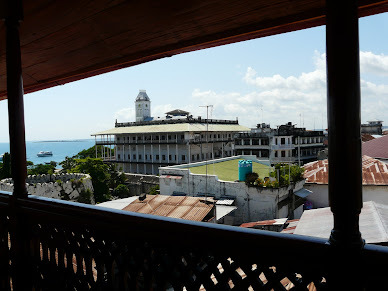
View of the Beit al Ajaib from the Jafferji Hotel (170 Gizenga Street)
Then we went to Zanzibar for five nights and six days. We stayed at the Jafferji Hotel & Spa. This used to be the house in which I grew up. The landlords of the house had converted it into a hotel. It was a wonderful experience to actually spend 2 days in it. Sitting in the big hall - which used to be our dining room cum major activities room for a family of 11 siblings, and in which we had held memorable events like Bhagvat Saptah, classical music concerts by eminent singers from India, banquets for dignitaries like the Indian Navy officers, Indira Gandhi, Julius Nyerere and the Indian High Commissioner for India Apa Panth - the feeling of peace and tranquillity as if I had never left ‘home’ engulfed me. Old memories of childhood days came back with inner gratitude and bliss. However, it was unusual to have a free-standing bathtub in this room. I was told they would fill it up with perfumed water if I wished to have a soak!
Our suite was named ‘Jafferji’ after the owner; another, which was our girls’ bedroom was called ‘Mercury’ after Freddie Mercury; we were lucky to see it as it had no guests. On the wall were photos of Freddie. Although the owners are Muslim, the old kitchen of our tenants, the Shah family, on the first floor was turned into a suite called ‘Kamasutra’ - it was the hotel’s honeymoon suite. I wonder if it had illustrations from the Sutra on the wall!!
Although called a Jafferji Hotel & Spa, the hotel had no spa. I was told that the shop which was once a printing press sub-let by my dad to two Suni brothers, was going to be converted into a spa and therapy suite.
The other shop, which was rented by a cobbler - a Surati mochi (mochi - cobbler or shoemaker), was now converted into the reception area of the hotel.
The owners have built an extra floor above what used to be our kitchen. Together with our old terrace, the whole floor has been converted into a kitchen and dining room area, retaining the kind of wooden carved parapet, the same as we had in other parts of the house. From here we got a beautiful view of the harbour and the surrounding buildings, including the Roman Catholic Church, Beit-el-Ajaib, a couple of mosques, and the Hindu Temple, reflecting the multi-religious community in which I grew up. It was nostalgic to recognise some familiar buildings, like Jani House, the Bohra School, and the terraces of our old neighbours.
Oh, I forgot to mention that some other guests were quite interested to hear that I grew up in that house. When we got into conversation with them, one young Dutch couple showed us their suite, which used to be my parent’s bedroom with an adjacent room that contained a bathroom. What an experience!
Must visit the site to see inside the rooms by clicking on SUITES. Our Jafferji suite and Kamasutra suites are superior suites. My parents’ room is Princess Salme Suite; our girls’ bedroom is Mercury Suite. You will be amazed to see the transformation of our old house.
http://jafferjihouse.net
The hotel also ran cooking classes for tourists, and once again, I couldn’t stop being a teacher and ended up instructing a young British man on how to roll a chapati!
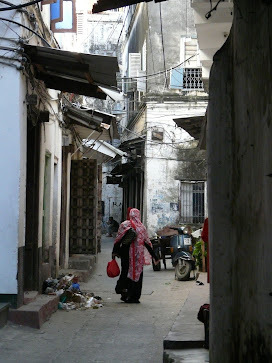 Stone Town Street Scene
Stone Town Street SceneWalking around the town brought different kinds of memories.
We visited our old school on the seafront. It was in a pathetic state and was for sale. We went to Seyyida Matuka School, the new school for girls where both Rozy and I had taught. We visited the Funguni Spit, behind Sultana Cinema, the area where Rozy lived. The creek has been reclaimed now. From there, we walked to the shop where my father had his automobile business., which had now turned into a tourist agency. Abundance hadn’t deserted me yet, and we were treated with fresh coconut water by the Kutchhi-speaking owner. We passed by the house where I was born. I remembered various people, friends and families as we walked by their homes and shops. Buildings in Stone Town seemed to be in much better condition than what I had seen 20 years ago. We visited the Catholic Church but couldn’t go inside as it was locked.
It was strangely pleasant to see the shops once owned by Indians now with local African owners. However, I missed the variety of goods that used to be sold in the Indian shops when I was a child, as most shops now sell the same kind of artifacts and handicrafts that attract tourists. Only three shops I came across were run by Indians. One was owned by a Bohora lady, selling books and postcards and one sold shoes - both in Shangani. One in Sokomohogo had sweets, cigarettes, and biscuits on sale. I was told there were more shops owned by Indians as you walk towards the Market area. Regretfully, we didn’t get the opportunity to visit that part of the town. (to be continued)
May 9, 2021
Different Shades of Diaspora - My Lived Experiences from...
Different Shades of Diaspora - My Lived Experiences from East Africa. Part 3 of 3.
by Urmila Jhaveri
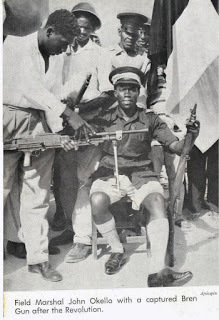
John Okello: the self-appointed 'Field Marshall' of the Zanzibar Revolution. January 1964.
INDEPENDENCE
On December 9 -1961 we all celebrated the Independence of Tanganyika with equally great expectations and aspirations under the leadership of President Julius Nyerere. From the beginning the President had insisted that Asians born and brought up in Tanganyika and for whom it was the only home should not be considered any lesser Tanzanians.
ZANZIBAR REVOLUTION AND ARMY MUTINY IN TANGANYIKA
Meanwhile in Zanzibar people were getting restless against the Arab Sultan. They staged a bloody revolution and toppled his regime on 12 January 1964. Within a week this was followed simultaneously by Army Mutiny in Tanganyika, Kenya and Uganda in quick succession. The Sultan fled from Zanzibar and scores of Arabs were killed on sight (Jacopetti, 1964) .
The Revolutionary Council members in Zanzibar married many Arab and Asian girls -teenagers and under age picked up from classrooms while parents tried to escape with their daughters under cover of darkness. In Dar -es-Salaam as well the mutineers had gone on rampage, looting Indian shops and killing the Arabs. It was all a very frightening situation as the President and his PM had gone incognito.
In Dar-es-Salaam, Manmohan Shukla and a group of Sikh boys were arrested when they were counting bullet marks on the Gurdwara wall. So as an elected MP, Jhaveriji was going round to the police station with Mr. Tara Singh to get them out. Others requested him to chase their car which had been hijacked by the mutineers. By and by President and the PM returned and the mutineers were disarmed with the help of British Government. To avoid any further upheaval Tanganyika and Zanzibar joined hands and Tanzania was born on 26 April 1964.
MULTIPLE MIGRATION & EXODUS
TANZANIA
Fortunately the Zanzibar Government allowed the resident Indians to take certain amount of cloves with them and leave if they wanted to. Many resident Asians of long standing took advantage of this offer and left.
In1967, President Nyerere established Arusha Declaration, codifying Leadership code and
Ujamaa - policy based on Socialism. This was followed in 1970-71 by nationalization of all private properties, banks, hospitals, schools, foreign trade, industries, and so on. Foreign travel and even educational allowances for students studying in foreign institutions was stopped. Our two houses were nationalized and our kids barely in their teens were left dangling without any support in a foreign country. It was a very distressful chapter of my life.
These whole sale take overs and restrictions affected Asians drastically and over night there was an exodus of Asians from Tanzania. With the help of the Aga Khan most of the Ismaili families migrated to Canada, Europe and Australia, while others found their own way out. In addition, Africanization policy resulted in 3750 British passport holding Asians leave Tanzania for Britain.
KENYA
From 1952 to 1960 Kenya had suffered the bloodiest Mau Mau uprising against the British during which time, according to Kenya Human Rights Commission some 90,000 Kenyans were executed and 160,000 were detained and tortured during the crackdown. This had started the trend of outward bound migration of Asians from Kenya. It was followed by Africanization. In addition in 1968, a new Immigration Bill introducing quota system to limit the entry of Asian immigrants holding British passport in Britain was introduced in the British Parliament. Before it became an Act, majority of the Asians who were affected left Kenya overnight in a hurry.
UGANDA
That apart, the worst blow fell in 1972 when some 80,000 British Passport holding Asians were forced to flee with their lives to Britain when Idi Amin of Uganda expelled them with a short notice of 90 days.
It so happened that on August 4 1972, we went to receive our niece Vinodaben, who had arrived by early morning flight from Nairobi and were surprised to see that she was detained inside the airport. Upon enquiry we were informed of Idi Amin's order expelling the British passport holding Asians from Uganda. It was shocking news. She was put on a flight back to Nairobi. In Nairobi Airport they took away her passport and brazenly told her that they had misplaced it and that her luggage has been sent onwards to Germany. She spent two frightening days and nights in the Nairobi Airport anxiously chasing her passport and ultimately reached Kampala sans her luggage. By that time the situation all over Uganda was getting worse day by day with looting, shootings and killing indiscriminately. It was no longer safe, so once again she was on a flight to UK.
But her nightmare was just beginning again. At Entebbe Airport she was searched at gun point. They snatched all her jewelry, money and all her certificates including all her official papers and then only allowed her to proceed onwards.
By and by like her all those 50 - 60,000 British Passport holding Asians including our family left Uganda penniless and scarred. And each of them has equally horrible experiences to recount!
Their properties and businesses were randomly appropriated and mismanaged beyond salvation. That apart, Amin's henchmen carried out systematic genocide so much so that it was alleged that so many corpses were dumped in Lake Victoria that drifting corpses regularly blocked the Owen Falls hydro electric Dam. His actions affected us all as we all had extended families and friends spread out all over EA.
Lots of water has passed under the bridge since then .The new settlers that is 'double and triple Diaspora‘ have migrated and re migrated in the Western countries, Canada, America where they have created all kinds of interesting roles to suit the changing environment world over. They enjoy Indian music, movies, food, and fashion, follow Indian culture, customs in their own way and celebrate festivals with gusto. That notwithstanding their home remains their new homelands and now there is no looking back for them.
Perhaps some of them may be lost in the maze of life but then on the other hand most of them have set their priorities right and aspire to reach highest goals and surpass new horizon in their new found home lands!
I thank you all for your kind attention.
REFERENCES AND NOTES
Postscript; eventually before the ninety days notice expired, Motabhai and family including my 95 years old Mother-in-law-Ba left Uganda and settled down in Britain. Late Motabhai and Bhabhi used to remember fondly the kindness and care given to them by the British people when they had arrived in the country painfully scarred. Especially pointing out that even close family members would not have been able to look after our Ba so lovingly!
Born in 1877 Ba followed her husband to Rajkot at a young age. After his death she came to Jinja - Uganda to join Motabhai around 1948. In 1972 following Amin's diktat migrated with the family to UK. She died peacefully in her sleep in 1981 at the age of 104 in Red Bridge -Illford.
Vinodaben retired recently after working all these years with Kodak Ltd. Vipinbhai a Banker who was Departmental manager in the Barclays Bank Kampala opened his little corner shop in Letchwork, worked hard and opened his own high street stores in London. He is now retired. Late Illaben qualified as a nurse initially, continued her education and branched out in banking and insurance while earning and raising her family. In fact, those enterprising Asians expelled from Uganda by Idi Amin thank the despot for creating the crisis, which enabled them to start their life afresh. Our son Atool & family are in Dublin, daughter Abha & her family in Delhi, granddaughters Ratna is in New York with UNO, the second one Meera in Rome with UNDP. Rohaan a banker is in Zurich and the youngest Roohi, an established artist is getting ready to get married and moving on!
In retrospect, it is gratifying to see our new generations well settled and independent, owning properties. Best of all their kids are well educated with the added advantage of having a fighting chance to prosper and progress in a developed country.
END NOTES :
Sourabh NC and MyllyntausTimo (2015), ‘Famines in India in the Nineteenth Century’ available at http://www.environmentandsociety.org/exhibitions/famines-india/timeline/famines-india-timeline, Last Accessed 27 January 2016. Also see India's forgotten holocaust by Churchill
https://en.wikipedia.org/wiki/Timeline_of_major_famines_in_India_during_British_rule, Last Accessed 27 January 2016
http/khojawiki.org/Gujarat Famines &Khoja Migration
Somjee, 2013, ‘Bead Bai’, 2013 and the blog on the book by the author available at http:/thebeadbai.blogspot.ca/. Last accessed on 27 January 2016
http/khojawiki.org/Gujarat Famines &Khoja Migration
The Agora, (2015) ‘A Tale of Two Railways’, available at http://www.theeagora.com/the-lunatic-express-a-photo-essay-on-the-uganda-railway/ Last Accessed on 27 January 2016
[Dukawala; Kersi Rustomji (2015) , ‘Ode to the Indian Dkawala on the East African Plains’, available at http://simerg.com/essays-and-letters/ode-to-the-indian-dukawala-on-east-african-plains Last accessed 27 January 2016
Regunathan Fischer, Lavanya and Shah Ramnik, (2015) The right to Belong ;An Overview of Historical and Recent Developments in Indian Citizenship Laws , the Journal of Immigration and Nationality Law Vol,29, no .3 of 2015, pp 256-272
Jacopetti/Prosperi's full 1964 documentary ‘Adios Africa’, available at https://www.youtube.com/watch?v=ICgj03-Jo0Y, Last accessed 27 January 2016
Below is an excellent link that describes the full history, including photos of Kampala at the time of expulsion of Ugandan Asians prepared by The Canadian Immigration Historical Society
http://carleton.ca/africanstudies/wp-content/uploads/Molloy-UGX40-fall-speaking-tour-Carleton-shared.pdf Last Accessed 27 January 2016
e.mail : urmilajhaveri@hotmail.com
Paper presented at the GRFDT National Conference on Migration, Diaspora and Development at the Indian International Centre, New Delhi during 20-21 February 2016
(with thanks to Opinion Magazine for permission to re-publish this story and to Bhadra Vadgama for alerting me to Urmila Jhaveri's amazing story).
April 27, 2021
Different Shades of Diaspora — My Lived Experiences from ...
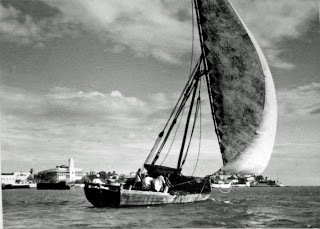
OUR DHOW SAFARI ACROSS THE INDIAN OCEAN FROM TANGANYIKA TO JAMNAGAR IN GUJARAT
By 1943, Hitler was poised to attack EA any time. In Dar-es-Salaam we had a complete blackout at night. Trenches were dug all over the town. Medicine and grains were in short supply. The army was on the move and prisoners and people were being ferried across the borders. For weeks on end, we watched convoy loads of traumatized Europeans being herded as German prisoners. All this while, my parents were getting worried. They decided to reach the safety of, 'Desh' - in India and stay in the family home in Jamnagar for the duration of the war. But the steamers had already been withdrawn, as a number of them were torpedoed and drowned in the Indian Ocean. The only option was to travel by Dhow. Bapuji hired Bijli the Dhow belonging to Kasimchacha. He was ready to set sail for India and had already made provision for the water to last for a month. Bapuji - my father filled up enough foodstuff and medicines, and my mother - Ba performed a short puja and thus began our 'Sindbad the Sailor safari 'when we siblings were just kids, unaware of what or where my parent's Desh (India) was!
For more than a month Bijli sailed through rough and tough high seas and silent nights. We were told to be quiet and not allowed to light a candle, even smoke a bidi, or to make any loud noise for the fear of being spotted by the enemy.
We watched shoals of whales and sharks with their calves and the play of nature, splendid and at times furious. Kasimchacha warned us not to disturb the huge mammals in any way. ‘Otherwise, they go crazy with fear and can even overturn a smaller craft. They follow a liner or a dhow feeding off its discharge.
To avoid German and Japanese submarines Kasimchacha sailed close to the coastline and bypassed Mogadishu and Aden. But while crossing the Indian Ocean to reach Socotra Island, Bijli weathered the worst storm of our journey. Miraculously we survived, but then mid-ocean, the wind died down leaving Bijli becalmed and unmoving. It was a perfect target for any passing submarines. Our drinking water was rationed, the sun was mercilessly hot, and we were thirsting for water in the middle of the deep ocean. Everyone including Kasimchacha started to pray fervently. Up to now, our journey was an adventure with the added sense of mystery and danger, but now we were in real trouble. As we waited and watched the clouds anxiously, the wind lifted suddenly and Bijli was on its way following the stars once again. Kasimchacha knew the sky and the stars as the palm of his hands and narrated fascinating stories about his travels to distant lands. Relying only on a compass, binoculars, a small courageous crew of only 5-6 daring family members plus his own navigating skill, our captain Kasimchacha brought us all safely on the shores of Gujarat.
Our fragile, perishable yet indomitable Bijli was but a tiny speck in that vast ocean, carrying an equally fragile yet strong cargo of human beings. Amazingly similar to all those sailors in their Dhows from yonder days we also traversed the mighty Indian Ocean towards an unfamiliar destination in search of security!
BRITISH PROTECTED PERSONS
In those days the term Indian Diaspora was not yet discovered. We were all classified as' British protected persons' holding British passports issued by the Colonial governments in India and EA. After the partition of India and Pakistan, we were identified as Asians still holding British passports. Our status changed when the East African countries gained independence and granted Citizenship to Asian applicants who qualified. While the Indian professionals employed by the newly independent countries were known as Indian Expatriates.
NEW BEGINNING
In 1945 we returned to Tanganyika - a country that was still being ruled by the British with an iron hand. For us, life began in earnest once again, mine on a different mode! Soon I was married to Kanti Jhaveri.
As a young student Jhaveriji had joined the Quit India movement started by Gandhiji in India and had organized a strike in his college. He was arrested and jailed in Rajkot. After arriving in Tanganyika as a young lawyer, he continued to take interest in freedom and human rights issues and got involved in the political struggle in Tanganyika immediately
At the time the Indian Association in the country was facing problems due to the India-Pakistan divide. This prompted the leaders of both the communities to change its constitution and rename it the Asian Association. They joined hands with Julius Nyerere and his party TANU and played a pivotal role, collectively and individually in the just starting struggle against British rule. To my mind, this stabilized the tense relationship between Tanzanians and Asians during that highly sensitive period.
Jhaveriji was much involved in this movement. I remember many late-night meetings, often attended by Julius Nyerere with his comrades to plan the strategy for gaining independence, being held at our home and in his chambers.
Soon in 1958, Nyerere was charged with anti-government libel and sedition. K.L. Jhaveri and N.M.Ratansi led by Mr. D.N.Pritt QC appeared to defend him. The atmosphere in the country was explosive and turned into relief and celebrations when the verdict came out as a token fine.
Apart from being President of the Tanganyika Law Society for 15 years and an elected MP before and after Independence Jhaveriji served as a member of many important commissions and committees including the Judicial Service Commission and Africanization Commission, Legal Corporation and so on.
The country was on the march. I was an active member of UWT - National Women's Organization Central Committee from its early days. It was our task to visit regularly the women at grass root level, understand their problems and help provide solutions. This gave me the rare opportunity of visiting all corners of the country. In fact, at the time I was the only Tanzanian woman of Indian origin to do so.
We used to visit and stay overnight in Ujamaa villages and settlements all over the country right in the jungles where there was nothing. Toilets were a hole in the ground with snakes dangling and wild animals roaming at night. Water had to be fetched from miles away. Apart from that the rural women were strictly bound by social taboos and restrictions. Domestic violence and the threats of instant Talaq were the order of the day for them.
Once after spending the whole day in the fields tilling the land and meeting people in one of the villages, our group returned to our rooms for an early night. Suddenly we heard the drums beating and people rushing about in panic. The village elders advised us that a group of witches was organizing a Ngoma dance under the Mbuyu tree. It was all about sorcery and not pleasant either. We should switch off all the lights and be quiet. Especially the Muhindi Mama. (Indian woman) Because if they sensed her presence they will definitely come to get her. I spent the night in a dark room under a blanket with some of my colleagues while Mama Sofia Kawawa who was the Prime Minister's wife and a couple of senior members stayed in the front room in case any unexpected guest turned up to investigate! We spent the night listening to drums beating frantically, dreading the knock on the door, and left early the next morning before the villagers woke up from their stupor.
Once in Dodoma, our delegation consisting of 10 - 12 members was being shown around the main hospital for mentally disturbed patients. The senior medical officer had explained that some of these patients were violent and had to be locked up. Some were just ranting away and left alone and others remained stark naked shouting for attention. We were warned not to laugh at all. While we were moving around a scantily dressed young man followed me purposefully and held my hand firmly. He would not let me go and started talking earnestly. Somebody whispered in my ears, 'Mama take it easy', and so I kept talking to him as we walked hand in hand. This went on for about half an hour before he lost interest and let me go. Now after all these years I find these experiences surreal.
Time does not allow me to continue but I would like to add that my best moments came when I met the women, shared problems, meals and songs, watched a teenager learn a craft and grandmothers learning to write her name alongside her grandchild. And not to forget, holding hands with an almost naked mad man and listening to witches' call at night! My involvement with these simple folks helped me to become a better human being and enriched my life to a depth beyond description, which shines within me like lighthouse beacon.
(with thanks to Opinion Magazine for permission to re-publish this story and to Bhadra Vadgama for alerting me to Urmila Jhaveri's amazing story).
April 25, 2021
Different Shades of Diaspora — My Lived Experiences from East Africa by Urmila Jhaveri. Part 1 of 3.
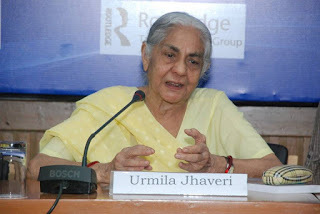
Urmila Jhaveri at the GRFDT Conference.
I consider it an honor, privilege and a pleasure indeed to be here and thank the organizers of JNU - GRDFT for inviting me to address this distinguished conference. I would also like to thank Dr. Sadanand Sahoo and Lavanya Regunathan Fischer for their help and encouragement. I must also confess that I feel very nervous being here because I am not an Academic like you all are. In fact, as I understand it, being Diaspora myself I am a part of the subject matter under discussion. My paper is based on our personal experiences gained during a lifetime lived in East Africa since Colonial times, sharing pre and post Independence struggles and its great and no so great moments. It is a long story, difficult to describe within a short period. However, I will try to give a glimpse of a few salient points of our experiences from East Africa with the hope that this brief account of mine will be of use to researchers and scholars interested in this part of our history.
THE EARLY MIGRANTS
Migration from India to Africa has been going on for more than a century and a half. This flow turned into a great influx during British Raj in India due to its scorched earth policy which caused horrific famines and prompted young men barely in their teens from Gujarat, Punjab and coastal regions to cross the mighty Indian Ocean by dhows and reach Zanzibar, Malindi and other villages on the coast of East Africa in search of a better life.(Sourabh,2015)
In addition, many Lohanas and members of other communities from Gujarat converted and became Ismaili Khoja, migrated to Africa, and settled down well with the full support of the Agakhan. (khojawiki.org)
Apart from that, the British brought some 31,983 indentured laborers as coolies to build the railways in East Africa. Many of these artisans were devoured by man-eating lions and succumbed to the hazards of jungle life by scores.(Agora, 2015)
These young migrants, unskilled and starting from scratch cleared the jungles inch by inch, followed the Rail, opened their small shops - dukas in their tin-roofed shacks and huts and started planting seeds brought from their villages in India. (Kersi Rustomji, 2015)
They thus opened up vast areas of the hinterland and steadily laid the foundation for development where nobody had dared to go. Gradually, many of them through sheer dint of their hard work, became renowned entrepreneurs, industrialists, businessmen and philanthropists. They built schools, hospitals, libraries, museums, ran many welfare organizations and donated handsomely for worthy causes.
MY FAMILY HISTORY IN BRIEF :
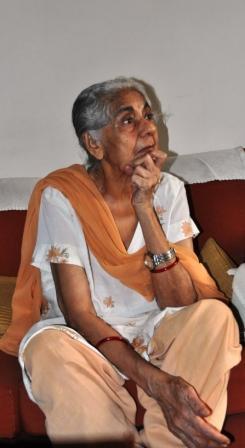 My own story began in early 1920s when my Gujarati parents Labhuben and Tarachand Gandhi arrived in Zanzibar by dhow from Jamnagar – Gujarat where my father joined the Arab Sultan’s government as a customs officer. I was born in the nearby island of Pemba in 1931. (presently part of Tanzania) My father then moved to Dar-es-Salaam and joined his elder brother to help run,’ Gandhi Medical Store, established in 1925. I grew up in Dar-es-Salaam during the harsh colonial regime, got married, had two lovely kids Atool and Abha by the time I was 21 years old. And together with my husband Kantilal Jhaveri took part in post and pre-independence struggles in Tanganyika - Tanzania. We experienced the exuberance of achieving independence and the birth of a new nation as well as the trauma of the Zanzibar Revolution, forced marriages, Army mutiny, Nationalization of assets, Mau Mau uprising in Kenya, Uganda debacle and so on.
My own story began in early 1920s when my Gujarati parents Labhuben and Tarachand Gandhi arrived in Zanzibar by dhow from Jamnagar – Gujarat where my father joined the Arab Sultan’s government as a customs officer. I was born in the nearby island of Pemba in 1931. (presently part of Tanzania) My father then moved to Dar-es-Salaam and joined his elder brother to help run,’ Gandhi Medical Store, established in 1925. I grew up in Dar-es-Salaam during the harsh colonial regime, got married, had two lovely kids Atool and Abha by the time I was 21 years old. And together with my husband Kantilal Jhaveri took part in post and pre-independence struggles in Tanganyika - Tanzania. We experienced the exuberance of achieving independence and the birth of a new nation as well as the trauma of the Zanzibar Revolution, forced marriages, Army mutiny, Nationalization of assets, Mau Mau uprising in Kenya, Uganda debacle and so on.
Now after spending, eight decades of my life in Dar -es-Salaam, here I am as a returnee holding an OCI card (Regunathan Fischer & Shah Ramnik, 2015) and a family spread out across the continents. We moved to Delhi for medical treatment where my husband passed away in 2014, leaving me to finish the rest of our ' manzil ' as best as I can.
CHILDHOOD EXPERIENCES
Tanganyika was a British Territory and similar to Apartheid in SA all aspects of our lives were strictly controlled: Europeans, Asians, Africans were completely isolated in separate compartments; Europeans occupied the highest positions and best localities, they were the Boss. Africans were placed in the lowest rung and the Asians were kept in the middle buffer zone to keep the status quo against the Africans and keep them downtrodden in the lowest rung as part of the British divide and rule policy.
Moreover, there were Hindus, Muslims and their sub casts. Intercommunity relations were generally harmonious and we were all Indians. But the rivalries between the two communities flared up from time to time after 1947. People thus continued to lead their lives absorbed in running their businesses, bound by the strict restrictions set by the Colonial Government and their own self-imposed conventions. I grew up in this environment, unmindful and preoccupied with growing up wide-eyed and learning lessons.
At the onset of World War II, our family had bought a sisal farm in Pugu from a German friend. Before leaving in a hurry, he had confided that there were Diamonds and Rubies on his land. Consequently, my father was running the farm and exploring for diamonds and rubies. It was like a thriller. We lived right in the jungle in a two-roomed brick house with a kitchen in the open verandah and the toilet in the garden. And in the dark of the night we used to hear elephants trumpeting, lions roaring and monkeys chattering while sharing my mother’s bed safely tucked under a blanket.
Bapuji never found any diamonds or rubies with his rudimentary equipment. Ultimately, they sold the farm. Since then rich veins of minerals have been found in that region.
He then bought a huge coconut farm in Bagamoyo. Situated on the edge of blue-green expanse of the Indian Ocean, it was serene and peaceful. However, in the days gone by, Bagamoyo was a notorious terminus from where dhows sailed with traumatised and chained human beings as a commodity for sale in Zanzibar and onwards.
The spacious central two-storied building that we used to occupy was formerly the Head Quarters Watch Tower of the slave traders. It was surrounded by about 30 dingy rooms where these captives were kept. The huge creaking gates were locked up at night for fear of lions entering the compound and attacking goats and people. But in spite of all the precautions, we could still hear the lions growling around and donkeys braying in fear.
To celebrate the harvest season Bapuji used to organize the traditional Ngoma dance. It started with melodious Tarab songs, drums rolling, hips swinging gracefully, bells jingling and ended with young men with painted faces adorned with cowry shells, animal skins, bobbing feathers and eyes flashing making fantastic somersaults. It was all very exciting and marvelous fun.
(with thanks to Opinion Magazine for permission to re-publish this story and to Bhadra Vadgama for alerting me to Urmila Jhaveri's amazing story).
February 4, 2021
91-year-old Bhanubahen Babla, née Kapadia - reminiscence...
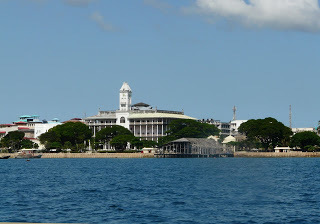
91-year-old Bhanubahen Babla, née Kapadia - reminiscences of some of her experiences as a girl of 11 in Zanzibar (1940s).
by Bhadra Vadgama née Kapadia
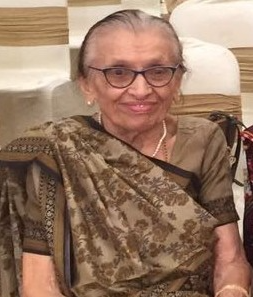
Bhanubahen Babla
The video in Gujarati (1hr 5min) is a recording of Bhanubahen when she was invited by Gujarati Literary Academy of UK [GLA] on 16 January 2021 to share her experiences with their members. Basically, Bhanubahen describes the items presented in an annual concert that took place at the end of the year in her Hindu Girls’ School in Zanzibar. Although the school was on the Main Road in Shangani, and because it didn’t have a big enough hall, the concert used to be held in what was then King George VI Secondary School for Boys opposite Mnazi Moja Grounds.
To begin with, the facilitator of the event Anil Vyas introduced Bhanubahen as one who was born and brought up in Zanzibar but had spent part of her life in India, Muscat in Oman and now residing in Mumbai, India. As a result she shared cultures of three different countries. Then I, Bhadra, her sister took over and introduced her in these words:
Eldest of 11 siblings, Bhanubahen was born in Zanzibar in December 1929, and I congratulate her for having completed 91 years of her life. She is never too old to learn new tricks and uses modern technology to keep in touch with her extended family and the vast number of friends she has globally.
She keeps fit by doing yoga and pranayam [yogic breathing exercises]; she sings, dances, and wins prizes in competitions; she reads spiritual and religious material, analyses what she has read and sends a small article in the form of an audio recording to some 75 ladies daily. Thus keeping them enlightened and encouraging them to have a dialogue with her about what they have heard.
Bhanubahen then started by saying that although 91 years old, in her heart she feels like she is 19. She then describes 8 items of various nature that were performed in a concert when she was 11 years old - first was a prayer to Sharada, Hindu Goddess of knowledge and arts, or to Mother India; then a welcome song, followed by dances. She sang the song that went with each item.
Two songs she commented on were about nature and women. She said they were taught to respect nature at a very early age. But humans have abused nature for ages. Now Covid-19 has reminded us harshly to take care of her.
The song about women says that women are the mothers of the world. They are the ones who have given birth to great men.
Finally, she recited the dialogues of 9 characters in a play about Lord Rama’s exile from the Hindu epic of Ramayana. Bhanubahen described how her song as Rama’s mother, bidding farewell to her son, had brought tears to many eyes in the audience. Later when her dad complimented her for her performance, she felt she had done justice to her role.
Because of her multi skills in singing and acting, Bhanubahen used to be a participant in 8 out of 10 items in the concert. She even played the old-fashioned upright harmonium to accompany an item performed by younger girls, multitasking by pressing the bellows with her feet, moving her fingers on the keyboard and singing at the same time, while concentrating on the dancing girls.
She then described the prizes given to girls at the end of the concert. Once her father had given a shilling to each of the participants and there were 60 of them. 80 years ago Shs. 60/= was a big sum of money. Bhanubahen said that prizes were given to the girls who stood first, second and third in their annual examinations. Not only she got prizes for standing first in her class, but an extra prize for her outstanding performance in the concert.
Here she was thanked by the current President of GLA, Vipool Kalyani.
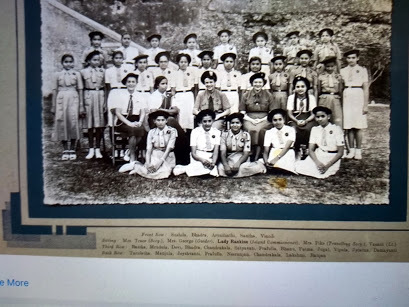
Hindu Girl Guides, Zanzibar 1952/53
Then, I asked her about her experience as a Girl Guide. She said her Guider was an English lady, Mrs Morley. She said she hardly spoke any English as the medium of instruction in her school was Gujarati. So, it was a delight for her to get a little practice of speaking English with Mrs Morley. She was promoted from being an Assistant Leader of Rose Patrol to become the Leader of Daisy Patrol. She then recited the Guide Promise and the 10 Laws and sang the Taps song.
She said she still does a good deed everyday by sending an audio reading to her friends daily.
91-year-old Bhanubahen Babla, nee Kapadia, reminisces ab...

91-year-old Bhanubahen Babla, nee Kapadia, reminisces about some of her experiences as a girl of 11 in Zanzibar (1940s).
by Bhadra Vadgama nee Kapadia
The video in Gujarati (1hr 5min) is a recording of Bhanubahen when she was invited by Gujarati Literary Academy of UK [GLA] on 16 January 2021 to share her experiences with their members. Basically, Bhanubahen describes the items presented in an annual concert that took place at the end of the year in her Hindu Girls’ School in Zanzibar. Although the school was on the Main Road in Shangani, and because it didn’t have a big enough hall, the concert used to be held in what was then King George VI Secondary School for Boys opposite Mnazi Moja Grounds.
To begin with, the facilitator of the event Anil Vyas introduced Bhanubahen as one who was born and brought up in Zanzibar but had spent part of her life in India, Muscat in Oman and now residing in Mumbai, India. As a result she shared cultures of three different countries. Then I, Bhadra, her sister took over and introduced her in these words:
Eldest of 11 siblings, Bhanubahen was born in Zanzibar in December 1929, and I congratulate her for having completed 91 years of her life. She is never too old to learn new tricks and uses modern technology to keep in touch with her extended family and the vast number of friends she has globally.
She keeps fit by doing yoga and pranayam [yogic breathing exercises]; she sings, dances, and wins prizes in competitions; she reads spiritual and religious material, analyses what she has read and sends a small article in the form of an audio recording to some 75 ladies daily. Thus keeping them enlightened and encouraging them to have a dialogue with her about what they have heard.
Bhanubahen then started by saying that although 91 years old, in her heart she feels like she is 19. She then describes 8 items of various nature that were performed in a concert when she was 11 years old - first was a prayer to Sharada, Hindu Goddess of knowledge and arts, or to Mother India; then a welcome song, followed by dances. She sang the song that went with each item.
Two songs she commented on were about nature and women. She said they were taught to respect nature at a very early age. But humans have abused nature for ages. Now Coronavirus has reminded us harshly to take care of her.
The song about women says that women are the mothers of the world. They are the ones who have given birth to great men.
Finally, she recited the dialogues of 9 characters in a play about Lord Rama’s exile from the Hindu epic of Ramayana. Bhanubahen described how her song as Rama’s mother, bidding farewell to her son, had brought tears to many eyes in the audience. Later when her dad complimented her for her performance, she felt she had done justice to her role.
Because of her multi skills in singing and acting Bhanubahen used to be a participant in 8 out of 10 items in the concert. She even played the old-fashioned upright harmonium to accompany an item performed by younger girls, multitasking by pressing the bellows with her feet, moving her fingers on the keyboard and singing at the same time, while concentrating on the dancing girls.
She then described the prizes given to girls at the end of the concert. Once her father had given a shilling to each of the participants and there were 60 of them. 80 years ago Shs. 60/= was a big sum of money. Bhanubahen said that prizes were given to the girls who stood first, second and third in their annual examinations. Not only she got prizes for standing first in her class, but an extra prize for her outstanding performance in the concert.
Here she was thanked by the current President of GLA, Vipool Kalyani.

Hindu Girl Guides, Zanzibar 1952/53
Then, I asked her about her experience as a Girl Guide. She said her Guider was an English lady, Mrs Morley. She said she hardly spoke any English as the medium of instruction in her school was Gujarati. So, it was a delight for her to get a little practice of speaking English with Mrs Morley. She was promoted from being an Assistant Leader of Rose Patrol to become the Leader of Daisy Patrol. She then recited the Guide Promise and the 10 Laws and sang the Taps song.
She said she still does a good deed everyday by sending an audio reading to her friends daily.
January 30, 2021
Sunset looking out from Ras Shangani, Stone Town, Zanzib...
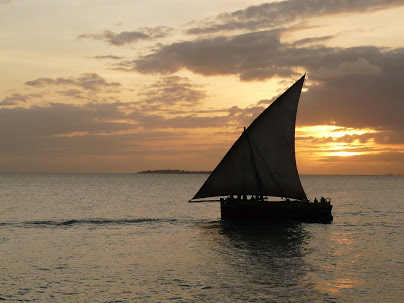
Sunset looking out from Ras Shangani, Stone Town, Zanzibar Island
Zanzibar. January 1964
An Unreported Massacre by
Bhadra Vadgama
Coup d’etat was a phrase I thought belonged to European history, until it happened on the peaceful, multiracial, paradise island of Zanzibar, my place of birth.
It was Sunday, 12 January, 1964. Instead of driving, my father decided to take a leisurely walk along the seafront to his shop to complete some outstanding accounts even though it was a Sunday. He had hardly gone half a mile, when he met an African samaritan who greeted him in Arabic.
'Shikamo, bwana Kapadia!' He seemed to know my father.
'Mahraba!' replied my father in the normal polite practice of greeting among the local Africans and Arabs.
'You must go back home, it's not safe for you to be out today.'
'But why?' My father was confused as the streets seemed to be as quiet as always for a Sunday morning when offices and shops were normally closed.
'There is some trouble on the Island. An army led by someone who calls himself Field Marshall Okello has taken over the police station next to your shop.'
'Okello? That doesn't sound like a Swahili name to me.' Thought my father.
'He has come from Uganda, so the rumours go,' the man said, as if he had read my father's mind.
My father returned home and told the family what he had heard. Everyone was relieved that he had come to no harm! Had he reached the shop, he would have definitely been killed by the mob.
Immediately, he switched on the radio to listen to the local station, only to hear that what the man in the street had said was true. The army had taken over the radio station and were declaring loudly that they had overthrown the local government which was predominantly made up of Arabs and a few Indians with the Sultan as their Constitutional Head. They declared themselves as the Peoples's Republic of Zanzibar and Pemba (Zanzibar's sister island). After that more and more announcements were made by the Revolutionary Government, threatening to kill anyone who disobeyed their orders.
I was at university in Uganda then, and shared the anxiety with all students from Zanzibar about the safety of our families. Our ears were glued to BBC World Service for Africa for presumably more accurate and reliable news.
All this was not only shocking but confusing for the people of Zanzibar as it had just received its Independence from the British a month ago. Originally both islands had been ruled by Omani Sultans since 1698, until the British intervened to stop the Slave Trade that thrived on the Islands and spread as far as Arabia, Persia, Egypt, India and the rest of the coast of East Africa. This intervention resulted in the British giving Zanzibar and Pemba the status of British Protectorate in 1890, and appointing a British Resident to govern the islands.
This description of the island by the explorer Richard Burton in 1856 sums up the natural beauty of this place which remained so for centuries.
'Earth, sea and sky, all seemed wrapped in a soft and sensuous repose...The sea of purist sapphire, which had not parted with its blue rays to the atmosphere...lay looking...under a blaze of sunshine which touched every object with a dull burnish of gold. Adding to the beauty were the gleaming white minarets of mosques and the sultan's palaces in Stone Town, making the city appear from the distance to Westerners as an "Orientalist" fantasy brought to life."
In 1950s, my British English teacher had referred to Zanzibar as 'an enchanting name of an enchanting island'. She compared it with Tennyson's island of Lotus Eaters. She said our motto should have been 'No hurry, no worry.'
With such perception of this island, it was difficult to believe a riot, let alone a coup, could ever take place here. So why did it happen? Before the abolition of the Slave Trade, the Arabs of Zanzibar used to import thousands of slaves every year from the mainland of Africa to work on their clove and coconut plantations. Some were exported to Ottoman Empire, Persia and Egypt. (ed. Some were exported to the Americas).The slaves were treated with such shocking brutality that the legacy of hate finally culminated into this revolution, and only because of the intrusion from a non-Zanzibari African.
Vivid descriptions of (violent) stories, by John Okello, who (said he) had fought with the Mau Mau movement against the British in Kenya, were enough to incite severe vengeance among many Africans who were descendants of slaves. They joined Okello whole-heartedly in killing the Arabs. Overnight some 5,000 Arabs were picked up from their plantations in rural areas and driven into the sea and shot from behind. In the faint light of the tropical moon, they looked like ghosts in their normal long white loose garments and white caps. Their bodies were buried in mass graves in a remote part of the island. Fortunately, Okello had spared women and children. He didn't want to hurt Asians either, though some were caught in the fighting and killed. One Indian girl was hit and killed by a bullet as she looked out of her window to watch a riot below her house. Although most rioters were armed with machetes, Okello had managed to steal guns from local police stations with the help of some African policemen who were sacked by the new Government a month ago.
Although many British people were detained, none were killed in the fear of repercussion from the British Government. Most of the British and Americans were evacuated by the USA navy. The Sultan and his family and a paraphernalia of his loyal servants were helped to escape by the British Government.
My 13 year old youngest brother had gone to Mombasa in Kenya for a holiday with my aunt's family. He was so devastated to hear about the coup that he let his imagination run wild and thought his whole family would be massacred and he would become an orphan.
Sobbing uncontrollably, he hugged my aunt and said, 'Please don't abandon me; if my family is killed you will adopt me and love me like your own son, won't you?' Remembering this incident, my brother still has shudders running down his spine.
Two of my young cousins were out on a beach for an overnight stay, when their BBQ party was interrupted by a truck full of rebels, who took them away and locked them up for two days without water or food. One of them was made to drive his car, while the rebels shot at Arab houses randomly and killed many pedestrians.
We all lamented for the ruination of our beautiful and peaceful homeland by this unexpected bloody coup.
May 13, 2017
Tanzanian Affairs 116 - Book Reviews by Martin Walsh of Cambridge University: Zanzibar Uhuru & Time Past in Africa
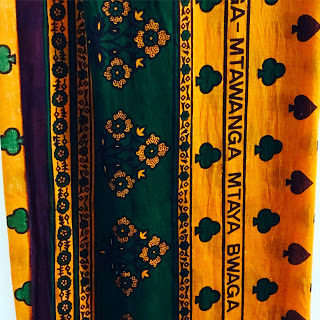
TIME PAST IN AFRICA: MERVYN SMITHYMAN AND FAMILY RECOLLECTIONS. Anne M. Chappel. CreateSpace, 2015. 222 pp. (paperback). ISBN 978-1517172275. £7.85.ZANZIBAR UHURU: A REVOLUTION, TWO WOMEN AND THE CHALLENGE OF SURVIVAL. Anne M. Chappel. CreateSpace, 2015. vi + 314 pp. (paperback). ISBN 978-1505511840. £10.00.Anne Chappel, the author of these two self-published books, is the daughter of Mervyn Vice Smithyman (1911-2008), best known to historians for the way in which his all-too-brief tenure as a Permanent Secretary came to an abrupt end on the day of the Zanzibar Revolution, when he was forced to flee by swimming out to a boat in the harbour. In their very different ways, both of these books, one a memoir and the other a historical novel, help put that unforgettable incident into proper perspective, not least by providing the personal details and context, real and imagined, that are absent in the cursory published accounts. For Mervyn Smithyman was not alone that day, but before making his own escape, made sure that his family and others were safe offshore, among them the 16-year-old Anne. These complementary works of fact and fiction can be read as her own reckoning with the past and the shocking events of that day. The first embeds it in family history; the second is a sensitive reflection on its consequences for the lives of others, including those less fortunate than herself.As a memoir, the richly-illustrated Time Past in Africa is also much more than this. Its first half traces Mervyn’s family roots and early life in South Africa, where he was born, and Nyasaland, where he spent the second half of his childhood. His parents, Fred Milner and Catherine Jessie Smithyman (neé Vice) worked their way up in colonial society from relatively inauspicious beginnings; the last of their ten children was born in 1933 and by the start of the Second World War they owned both a large family house with stables and a separate holiday home, and were running a hotel, a mineral water factory, and a brewery in Zomba. Mervyn had a job as a junior clerk in the Department of Agriculture, and repaired typewriters for the government in his spare time, work which gave him the time and means to travel around the world in the year before the outbreak of conflict. During the War itself he served as an officer in the King’s African Rifles, rising to command a battalion in India, and this experience stood him in good stead when he applied to join the British Colonial Administration.The second half of the memoir details his subsequent career in Tanganyika and Zanzibar. His first posting was as Assistant District Officer in Mwanza; he went there in 1947 with his wife Audrey and son Michael, and they were soon joined by baby Anne. He was then posted to Bukoba and soon after to Biharamulo, where he was District Commissioner. In 1949 he was transferred to Same in Pare District, and stayed there until moving to the Secretariat in Dar es Salaam in 1953, where he worked in the District Administration Department and got to know the Governor, Sir Edward Twining. In 1955 he was appointed Senior District Officer in Mbeya, and that was his last tour on the mainland before being offered the post of Senior Assistant Commissioner in Zanzibar, a job he began in September 1956 by serving for six months as District Commissioner of Pemba, based in Wete. In early 1957 he moved to Zanzibar town, and began the period of his career that has attracted most scrutiny by researchers, coinciding as it did with the zama za siasa, the ‘time of politics’ and series of hotly contested elections that preceded Zanzibar’s Independence in December 1963. Smithyman agreed to stay on for a time as Permanent Secretary under the new Prime Minister, Mohammed Shamte. But, as we now know, this lasted for little more than a month.The most gripping parts of this memoir are his and other family members’ recollections of what happened on that fateful day. They differ somewhat from previously published accounts, and add new details, for example about the disagreements between different expats and members of the government over how they should respond to the rapidly evolving crisis on the morning of 12 January 1964.The novel, Zanzibar Uhuru, takes off from a fictionalised version of the same events. Like the memoir, it is written in different narrative voices. The first section, which focuses on the first weeks of the Revolution, even includes a few harangues and mad rambles in the hectoring and self-justifying tones that were typical of the speeches and writings of the self-styled Field Marshal John Okello. But the real stars of the story are two women who relate their struggles with the myriad consequences of the events that Okello set in train. The suffering of the first of these, a Zanzibari Arab orphaned during the Revolution, is very persuasively told in the middle section of the book, and carries the tale. The third and final section takes us back to the life of the daughter of a British official whose flight from Zanzibar recalls that of the real-life Smithyman, and brings us forward to the present, when the lives of the two women become intertwined again. Like all good historical novels, Zanzibar Uhuru leaves you wanting to know more about the events it is based on, and which of them might be true. It has been carefully researched, and includes references and a list of further reading for good measure. I only noticed a few minor slips.Zanzibar Uhuru is boldly conceived and compellingly written. Critics aware of Time Past in Africa and the author’s background will accuse her of reproducing the worldview and political prejudices of her own family and class. But as a survivor of the Zanzibar Revolution herself, she has every right to tell and re-imagine her tale. Although more than half a century has now passed since the Revolution, the wounds it opened are still raw, especially for the women who live with painful memories of the brutality they and their loved ones suffered when their worlds were turned upside-down. Anne Chappel is to be congratulated for bringing part of that story to us, and I hope it will encourage others to do the same, in whatever narrative or creative form.
Martin Walsh
February 14, 2017
ZANZIBAR RECOLLECTIONS By Bhadra [nee Kapadia] Vadgama
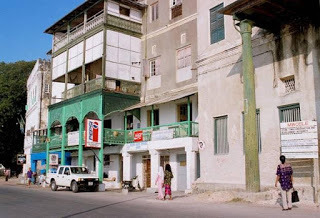
Zanzibar Government Girls Secondary School (before 1964)This photo shows my school, half of the brown building. We didn't have any labs there so we didn't study physics or chemistry. We studied Biology and Health Science only. For sport girls went to the fort where they played netball. We didn't have PE either. Until Mrs Shukla started teaching there, Mr Nayak used to come to our school to teach Gujarati in the afternoon, three times a week. For domestic science, which was taught as an extra subject without an exam at the end. Art was also taught as a recreational subject.
My dad Vallabhdas Hirji Kapadia, better known as Manubha Kapadia, had a motor car and accessories business called Kapadia Motor Mart Ltd. in Zanzibar and because he had been a prominent figure in the socio-political life of the Island, our family was well known among wide range of communities and officials.I went to Govt. Girls Sec School near the seafront close to Customs Office before going to Makerere College. Rozina Visram and I were the only 2 girls in 1956 to get a 1st grade in Cambridge Overseas SC Exam. I went to the World Centenary Girl Guides Camp to UK in 1957. I also taught at Seyyida Matuka School.We, as children of 40s & early 50s, went to see 1 shilling all round Indian film shows on Sundays and at the Forodhani with 10 cents we could buy a stick of roasted mohogo, a handful of jugus, 2 pieces of ganderi and a slice of pineapple or mango, or a matufa or chana bateta.In 1999 August, my sister Kanak from Mumbai, my younger daughter Jaanki & I went to Zanzibar. We went to visit the Palace Museum. I had never been inside the palace before, so for me it was quite an experience. I was delighted to see royal portraits painted by our art teacher Maalim Farhan. We had a teenage boy as our guide and some Australian tourists in the group. The poor lad had probably learnt by heart what he was supposed to tell us. He found himself taken over by Kanak, who talked about the first ever lift in Beit-el-Ajayab and how as young children we used to go up and down in it just for fun, and what the word Beit-el-Ajaib meant and that it was a palace before etc. etc. She described what it was like when Seyyid Khalifa had died and how she had come to pay her respect to the dead Sultan and express her condolences to Bibi Nunu.We saw the special room of the Princess Sayyida Salme [Seyyid Barghash's sister] who had eloped with a German officer. I came to know about her when I had visited the museum in Muscat. I had not known anything about her in Zanzibar. At one point the poor lad who was our Guide, frustrated by our interruption, stopped us and said, 'Please let me talk about it.' The Australians were of course delighted to hear all our anecdotes. They told us we had made history alive for them.Talking about Bibi Nunu, I remember when I was 8 or so (1948) I had been chosen to present a bouquet to her for an occasion (I can't remember what it was)that was held in the assembly hall of Government Boys Secondary School. I wonder if there will be a photo somewhere in the archives of Zanzibar Museum!As mentioned earlier, I was chosen as the best Girl Guide from 7th Zanzibar Company [which ran as part of the extracurricular activities for the pupils of Hindu Kanyashala]to attend the World Centenary Camp to be held in Windsor Parkin UK. So suddenly I was prepared to take all sorts of tests so I could have lot more badges on my sleeve. To be chosen for the Camp, I had to compete with the Guides from other Zanzibar Companies and attend a camp with Guides and Guiders from Dar.My first encounter with racism and awareness of my citizenship happened during this trip to UKwhile I was attending the Camp. Initially, I was chosen to be presented to the Queen. I was even taken for the rehearsal and taught how to curtesy and so on. However, later in the day a very worried looking Guider came to me and said, 'I am extremely sorry, but we have just received a telegram from Zanzibarand they have asked us to replace you by Saada Khamis [an Arab Guide from Zanzibar who was also attending the Camp] to be presented to the Queen.' The Guider thought I would burst into tears, but I was not much upset by missing the opportunity. I suppose I was too young to realize the implication.Also, perhaps I wasn't bothered, as in Zanzibar I had the opportunity of seeing at close range many celebrities like, Rita Hayworth & Prince Alikhan, Dr S. Radhakrishnan, Princess Margaret, etc. at garden parties held in the British Residency grounds or Victoria Gardens where we served food to the guests in our Girl Guide uniform.I also became aware for the first time, that although I had gone to the camp as a Zanzibari, I had chosen to wear chania-choli & odhani as my national dress. I taught other Guides a song in Gujarati, and not in Swahili. I was a Zanzibari BUT culturally I felt totally Indian. At the Camp, nobody wanted to know me as an Indian, as there were about 30 Girl Guides from India [and I didn't belong to them] who performed Indian dances in the evening as part of our entertainment. Saada and I, as Zanzibaris, had not prepared anything in particular to represent our island's identity. So here I was a young 16 year old with no awareness of the implications of my citizenship or identity. I realized all this much later in my life. On arrival back to Zanzibar, a reporter had asked me if I had seen the Queen, and my reply was, 'Yes, I saw her clearly as being short, I was in the front row.' I didn't even think of telling him about the last minute swap.



